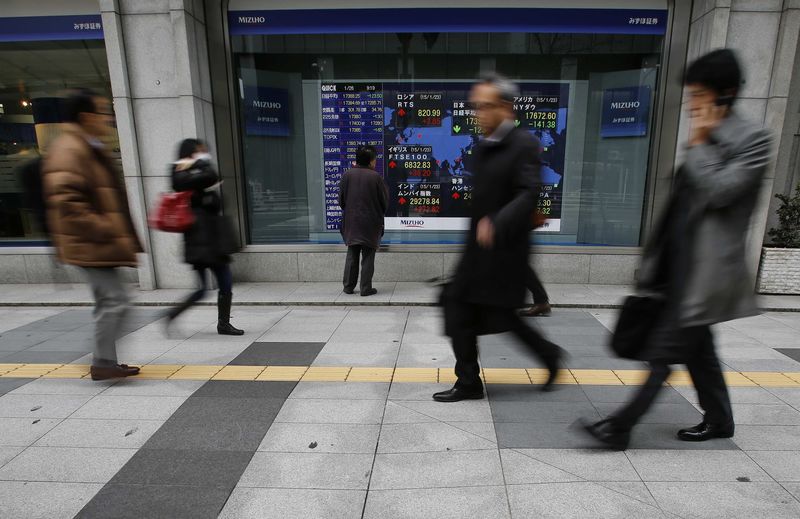Asian markets brace for fall amid rising US Treasury yields
Investing.com - Asian stock markets are bracing themselves for a plunge on Friday, following an unexpected surge in US private employment figures which sent Wall Street into disarray and caused Treasury yields to spike.
Forecasts indicate drops exceeding 1% at the opening bell for both Japan's and Australia's share markets, with Hong Kong set for a slightly lesser dip. Investors dealing in Chinese assets will be closely monitoring the meeting between US Treasury Secretary Janet Yellen and Premier Li Qiang in Beijing, searching for any positive signals regarding the strained trade relations of these two economic powerhouses.
Thursday marked a downturn day on Wall Street when S&P 500 and Nasdaq 100 indexes slipped by 0.8%, following revelations from ADP (NASDAQ:ADP) Research Institute that US firms had increased their workforce numbers at their fastest rate since over a year ago in June – highlighting potential inflationary risks due to robust labor market conditions.
David Donabedian, CIBC Private Wealth US's chief investment officer commented that this steep drop is rooted in concerns about unstoppable economic growth forcing Federal Reserve officials into more aggressive actions - sentiments clearly echoed within bond market reactions.
This has led swap contracts linked with future policy moves to almost completely anticipate an increase of quarter-point interest rate by the Fed come July 26th, along with growing speculation of another hike before year-end.
These higher rate expectations further bolster assumptions of tighter monetary policies worldwide as central banks grapple with controlling inflation back within target limits.
BOJ holds fast to yield curve control policies despite inflation concerns
Bank of Japan (TYO:8301) Deputy Governor, Shinichi Uchida, affirmed the central bank's commitment to sustaining its yield curve control policy to maintain easy monetary conditions, according to a report in the Nikkei newspaper on Friday.
Uchida noted that the decision-making process involves factoring in how best to uphold relaxed financial circumstances while also considering potential impacts on financial intermediation and market functionality. This response came when he was queried about possible alterations in limits set by BOJ for long-term interest rates.
Amid an environment where inflation has surpassed its 2% target consistently over a year, there is growing market conjecture regarding potential changes in BOJ's yield curve control (YCC). The YCC policy essentially sets short-term interest rates at -0.1% and caps a decade-long bond yield approximately at 0%.
However, Uchida dismissed any possibility of an abrupt cessation of negative short-term rates asserting that such action would equate with a 0.1% rise in interest rate—an inappropriate move given current economic scenarios as per his statement reported by Nikkei.
The YCC was introduced back in 2016 after numerous attempts involving heavy asset-buying failed to stimulate inflation towards BOJ's desired 2% target mark. Despite this strategic move receiving criticism from investors for distorting market prices and gradually eating into profits earned by financial institutions due to prolonged low-rate periods, it remains upheld.
While acknowledging side-effects like impact on market functions brought upon by YCC policies, Uchida emphasized that supporting the economy amidst recent shifts observed within corporate wage structures and price-setting activities remains paramount for the central bank.
He further stressed that prematurely altering the existing policy potentially risks missing their targeted 2%, which poses greater threat than being late tightening policies leading to sustained above-2% inflation rates.
Yellen lands in Beijing amid escalating trade tensions
US Treasury Secretary Janet Yellen has touched down in Beijing amidst the rising heat of trade disputes between two global economic giants. The anticipation for any significant breakthrough in their frosty relations remains minimal on both fronts.
Yellen took to Twitter to express that her journey presents a chance to foster better communication and ward off any potential misunderstandings or misinterpretations. However, this might just be the extent of what is accomplished during her stay — a sentiment echoed by investors who aren't foreseeing much more progress.
The already pessimistic outlook investors hold towards China’s economy and market took another hit following a disheartening report from Goldman Sachs (NYSE:GS) about Chinese banks on Wednesday. This prompted an extensive sell-off involving Hong Kong-listed bank stocks within the country.
In response to concerns over government debt, Goldman Sachs demoted several key Chinese banking institutions, exacerbating anxieties surrounding an industry already grappling with challenges posed by a faltering property market and slow-paced economic growth.
